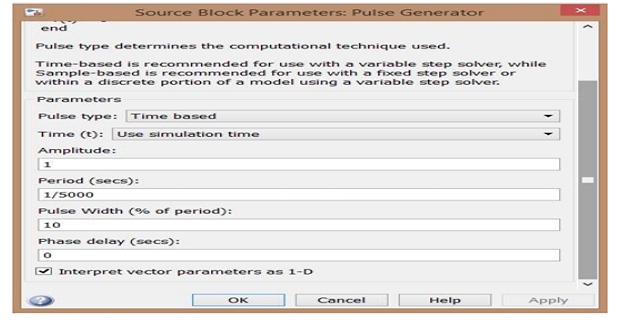DC to DC Converter
Demonstrative Video
Aim
To study the operation of DC - DC converters using MATLAB Simulink.
Converter topologies:
- Buck Converter
- Boost Converter
- Buck-Boost Converter
Simulation tools required:
MATLAB
Simulation Procedure:
- Construct the circuit in the MATLAB, Simulink.
- Use pulse generator to generate the gate pulses to the IGBT of the DC-DC converter.
- Configure the pulse generator as shown below.
- The duty cycle of the converter is varied by changing the Pulse width in the pulse generator.
- Vary the duty cycle as shown in observation table above and note the output voltage values.
- Use the output voltage formula of each converter type to compute the output voltage calculated in the observation table. For example, considering a
- Buck-Converter, the output voltage can be expressed as \( V_o = D\cdot V_{in}\)
- Boost-Converter, the output voltage can be expressed as \(V_o = \dfrac{1}{(1-D)} \cdot V_{in} \)
- Buck-Boost Converter, the output voltage can be expressed as \(V_o = \dfrac{D}{D-1} \cdot V_{in} \)

Block Diagram of Buck Converter:

Pulse generator showing 40% duty cycle

Block Diagram of Boost Converter:

Block Diagram of Buck-Boost Converter:

Results:
Buck Converter
- Attach the circuit diagram of Buck - converter with R Load in MATLAB Simulink
- Attach the Simulated Waveforms at 40% duty cycle (Source voltage and current, Output Voltage and Current, Voltage across IGBT)
- Observation table:
|
Sl. no |
Input Voltage (Vin) |
D, Duty Cycle =Ton / T (%) |
Calculated output voltage (V) |
Simulated output voltage (V) |
|
1 |
|
20 |
|
|
|
2 |
|
40 |
|
|
|
3 |
|
60 |
|
|
|
4 |
|
80 |
|
|
Boost Converter
- Attach the circuit diagram of Boost - converter with R Load in MATLAB Simulink.
- Attach the Simulated Waveforms at 40% duty cycle (Source voltage and current, Output Voltage and Current, Voltage across IGBT)
- Observation table:
|
Sl. no |
Input Voltage (V) |
D, Duty Cycle (%)Ton / T |
Calculated output voltage |
Simulated output voltage |
|
1 |
|
20 |
|
|
|
2 |
|
40 |
|
|
|
3 |
|
60 |
|
|
|
4 |
|
80 |
|
|
Buck-Boost Converter
- Attach the circuit diagram of Buck – Boost converter with R Load in MATLAB Simulink
- Attach the Simulated Waveforms at 40% duty cycle (Source voltage and current, Output Voltage and Current, Voltage across IGBT)
- Observation table:
|
Sl. no |
Input Voltage (V) |
D, Duty Cycle (%) = Ton / T |
Calculated output voltage (V) |
Simulated output voltage (V) |
|
1 |
|
20 |
|
|
|
2 |
|
40 |
|
|
|
3 |
|
60 |
|
|
|
4 |
|
80 |
|
|